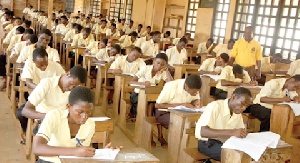- Home - News
- TWI News | TV
- Polls
- Year In Review
- News Archive
- Crime & Punishment
- Politics
- Regional
- Editorial
- Health
- Ghanaians Abroad
- Tabloid
- Africa
- Religion
- Election 2020
- Coronavirus
- News Videos | TV
- Photo Archives
- News Headlines
- Press Release
General News of Tuesday, 23 August 2016
Source: thefinderonline.com
Revert SHS to 4 years – PTA demands
The National Council of Parent-Teacher Association has backed calls for the duration of the senior high school (SHS) education to be reversed to four years.
The council argues that students effectively study for two years two months in the current 3-year SHS system and write the West Africa Secondary Schools Certificate Examination (WASSCE).
President of the association, Mr Alexander Yaw Danso disclosed this to The Finder in an interview.
In view of the divided opinion on this hot issue, he suggested a forum for stakeholders to discuss the way forward for senior high school education in Ghana.
Challenges in SHS education
He identified the lack of monitoring, inadequate textbooks, poor commitment of some teachers to the profession and the short time for senior high school education as the key challenges.
Mr Danso described the 2016 WASSCE results as abysmal and explained that the council has monitored the results of WASSCE for years and noticed that the standard of education in the country is falling.
Over 1 million flop at WASSCE in 6 yrs
From 2011 to date, the pass rate for core subjects are 2011 - 38.1745%,2012 - 42.1666%, 2013 - 29.1305%, 2014 - 28.4687%, 2015 - 16.8364% and 2016-24.7197%.
Over one million (1,081,020) out of the over 1.5 million (1,510, 624) candidates who sat for the West Africa Senior Schools Certificate Examination (WASSCE) between 2011 and 2016 failed to secure grades A1 to C6 in the three core subjects required for admission into tertiary institutions.
The cut-off point for admission into universities in the country is A1 — C6.
Data from the West African Examination Council (WAEC) analysed by The Finder revealed that only 429,604 out of the over 1.5 million (1,510, 624) candidates who sat for WASSCE within the six-year period (2011 to 2016) obtained grades A1 to C6 in the key core subjects.
The 429,604 candidates whosecured A1 to C6 within the six-year period constitute 28.44%, while the over one million (1,081,020) who obtained grades D7 - F9, considered as not good enough for admission into tertiary institutions, constitute 71.56%.
These were contained in a document titled ‘Performance statics at Grade A1 to C6 in six subjects including Maths, English and Integrated Science or Social Studies (WASSCE 2011 to 2016)’.
Within the period, the data revealed that over 1.5 million (1,518,248) candidates registered for WASSCE but 7,621 were absent.
Therefore, the total number of candidates who took the examination was 1.5 million (1,510, 624).
Inadequate textbooks
Mr Danso stated that senior high schools (SHS) do not have adequate textbooks, saying when school re-opens SHS students would not have textbooks.
According to him, the last time the Ghana Education Service supplied textbooks to schools was some four years ago.
He urged government to fulfil its part of the obligation by providing textbooks for students to perform well in the examination.
Poor supervision
He identified poor monitoring of tutors as one of the major challenges resulting in the poor performance of candidates.
He called on the Ghana Education Service (GES) to adhere to its duty of ensuring effective supervision of teachers to make them cover the number of hours required for teaching.
He observed that GES has drifted focus from its core mandate of ensuring quality education for Ghanaians.
Poor commitment of tutors
Mr Danso stated that some teachers are not committed to their profession and rather concentrate on extra classes after school to make additional income.
According to him, a lot of the teachers concentrate on producing pamphlets, some of which are below the standard, as a means of making additional income.











